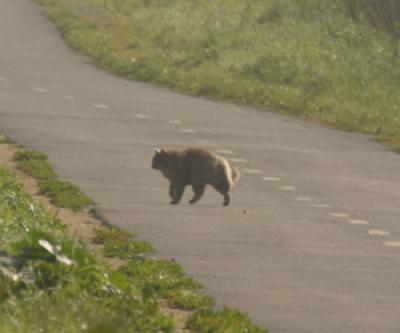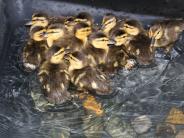Dealing with Wild Animals
From time to time undomesticated or "wild" animals such as raccoons, skunks, squirrels, rats and opossums wander into residential and commercial areas. The Peninsula Humane Society advises citizens not to attempt to capture or trap wild animals. A qualified animal control company is best qualified to handle traps and animals. To find a pest control company, look in the yellow pages or do an online search for "wildlife pest control in San Mateo County."
Like people, animals seek food, water and shelter. The most effective protection from unwanted wild animals in your area is barriers and discouragement. Prevent them from accessing spaces around your home or yard and remove whatever attracts them to your property.
Feed pets indoors if possible or take up the outdoor dishes and leftovers as soon as possible. Keep trash cans in a closed garage or utility room until trash pickup day. Fence your garden. Eliminate places that could become a den for a raccoon. Fill in tree cavities, cap chimneys and seal off attics, but always make sure an animal is not inside first.
Even if your pets are primarily indoors, it is always a good idea to vaccinate your pets as it protects them from interaction with undomesticated animals that may occur if the pet gets out or the wildlife gets in.
The Peninsula Humane Society (PHS) has an excellent on-line guide to "Living with Local Wildlife" which you can access here.
Wildlife in Need?
If you find a wild animal that may appear orphaned, injured, or in distress, please call the Peninsula Humane Society (PHS) & SPCA at (650) 340-7022 for guidance and assistance. If it’s safe to do so, you can also bring the animal directly to us at our Center for Compassion located at 1450 Rollins Road in Burlingame between the hours of 11:00 A.M. and 6:00 P.M. every day. If you find a wild animal in need of care after hours and it’s safe to transport, please bring the animal to After Hours Receiving at the Coyote Point shelter, located at 12 Airport Blvd in San Mateo. Do not give any food, water, or medicine – that often does more harm than good. Do not attempt to remove fishing line or something that may be caught or tangled around the animal. For more information, please visit https://phs-spca.org/wildlife/found/.
Skunk Problems in Foster City
The City has been in contact with county, state and federal wildlife officials to bring you this information about skunks:
If skunks have taken up residence on your property, as opposed to just passing through, you may need to hire a trapper. You can select a trapping service through the yellow pages under "Pest Control".
Once the skunks are removed, here is the advice that the City has received from the Peninsula Humane Society (PHS) and other "skunk experts" about how to keep them away:
PHS advocates critter-proofing yards as the best way to discourage skunks. PHS says skunks do not climb, so they will go after what is on the ground. They eat rodents and insects, pet food and any trash they find at ground level. They will dig under fences or squeeze under gates with a higher ground clearance, so these are areas that should be secured, too.
There have been no reported cases of skunk or raccoon spread rabies for many years. PHS says that skunks do not automatically use their spray, so if a skunk is encountered you usually can back away slowly and quietly and not get sprayed.
Here is some additional information from another urban wildlife expert –
Fake great horned owls may help to deter the skunks. You can do an Internet search for "fake owls" and find places to order them. Stores like OSH or Home Depot may also have them. Skunks have poor eyesight and do not climb, so you need to place the fake owls nearest to where you see the skunks' boroughs or other activity.
Apparently skunks do not like rain and wet conditions. If they are wet, they are highly susceptible to getting pneumonia, which is fatal to them. There has been a significant rise in skunk populations throughout the bay area in the past two years due to poor rainfall. According to the skunk expert, rainy years mean more skunks die of pneumonia. So rain keeps the skunk population in check. If we get more rain this year, we may see a decline in skunk activity.
If you find a good skunk deterrent, please let the City know so we can share your success with others! Call the City Manager's Office at (650) 286-3220. Thank you!


